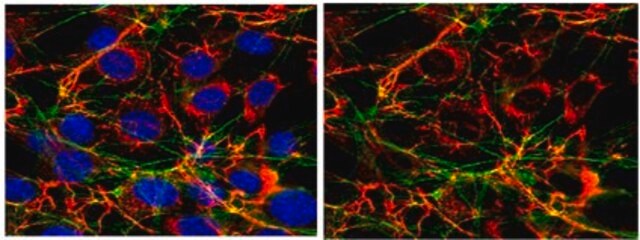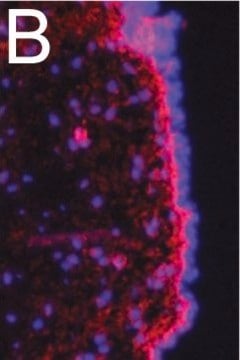CP70
Anti-Fibronectin (Ab-3) Mouse mAb (FBN11)
liquid, clone FBN11, Calbiochem®
About This Item
Produits recommandés
Source biologique
mouse
Niveau de qualité
Forme d'anticorps
purified antibody
Type de produit anticorps
primary antibodies
Clone
FBN11, monoclonal
Forme
liquid
Contient
≤0.1% sodium azide as preservative
Espèces réactives
rat, human, mouse
Fabricant/nom de marque
Calbiochem®
Conditions de stockage
do not freeze
Isotype
IgG1
Conditions d'expédition
wet ice
Température de stockage
2-8°C
Modification post-traductionnelle de la cible
unmodified
Informations sur le gène
human ... FN1(2335)
mouse ... Fn1(14268)
rat ... Fn1(25661)
Description générale
Immunogène
Application
Immunoblotting (0.5-1 µg/ml)
Immunofluorescence (see comments)
Immunoprecipitation (2 µg/mg protein lysate)
Paraffin Sections (0.5-1 µg/ml, heat pre-treatment required)
Conditionnement
Avertissement
Remarque sur l'analyse
SW 156 cells or normal kidney tissue
Autres remarques
Armstrong, P.B. and Armstrong, M.T. 2000. Biochim. Biophys. Acta1470, O9.
Barilla, M.L. and Carsons, S.E. 2000. Semin. Arthritis Rheum.29, 252.
Yamada, K.M. 1989. In Fibronectin, Mosher, D.F., ed., p. 47.
Rouslahti, E. and Pierschbacher, M.D. 1986. Cell44, 517.
Pytela, R., et al. 1985. Cell40, 191.
Informations légales
Vous ne trouvez pas le bon produit ?
Essayez notre Outil de sélection de produits.
Code de la classe de stockage
11 - Combustible Solids
Classe de danger pour l'eau (WGK)
WGK 1
Point d'éclair (°F)
Not applicable
Point d'éclair (°C)
Not applicable
Certificats d'analyse (COA)
Recherchez un Certificats d'analyse (COA) en saisissant le numéro de lot du produit. Les numéros de lot figurent sur l'étiquette du produit après les mots "Lot" ou "Batch".
Déjà en possession de ce produit ?
Retrouvez la documentation relative aux produits que vous avez récemment achetés dans la Bibliothèque de documents.
Notre équipe de scientifiques dispose d'une expérience dans tous les secteurs de la recherche, notamment en sciences de la vie, science des matériaux, synthèse chimique, chromatographie, analyse et dans de nombreux autres domaines..
Contacter notre Service technique








